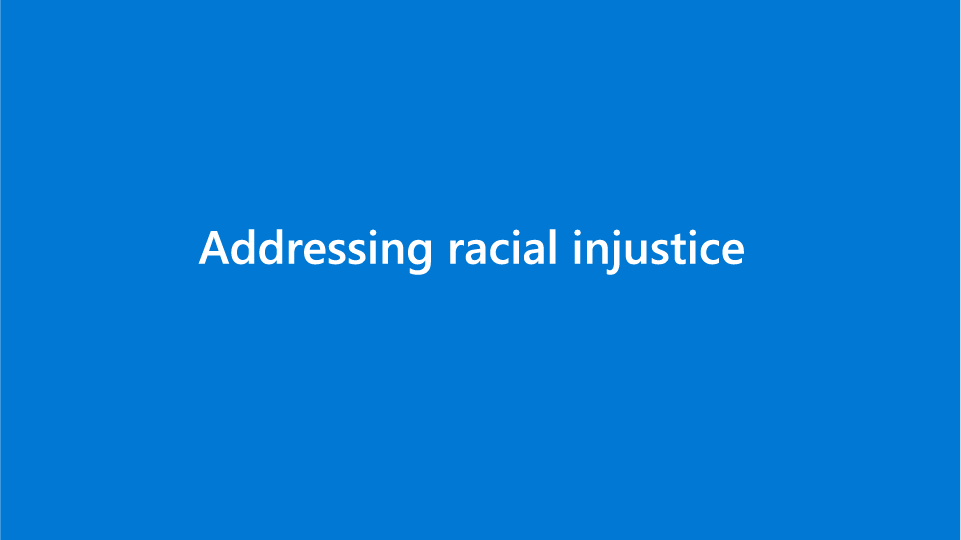I had meant to talk about Microsoft’s commitment to battling inequality earlier this year but I have to be honest it has been incredibly difficult to write anything consistently. However a conversation this afternoon reminded that both Microsoft, and now Apple, have elected to quite publicly make contributions to directly combat structural inequalities.
While both strategies overlap they both manage to go in quite different directions. What I like most about Microsoft’s strategy is that it started with its own culture (which needs improvement). I thought it was also important to note that Apple has, disappointingly, not publicly released an annual diversity report since 2018.
I have highlight what I believe the most important points, I think it would be interesting to see the results of the initiatives a year or two from now.
Microsoft
[06/2020]
Increasing our representation and culture of inclusion
Each of us must be able to thrive in diverse teams. Every manager must be able to attract, retain, and grow employees of all backgrounds.
- Managers who have a deep understanding and commitment to building inclusive culture are key to our company’s success. Starting in FY21, our training on allyship, covering, and privilege in the workplace will be required for all employees, with additional new content on understanding the experience of the Black and African American community.
- We will strengthen our intentional career planning and talent development efforts. This will apply across our workforce, beginning with Black and African American employees. These programs will expand to include other employee groups as we learn and grow. We will expand on our leadership development programs for select Black and African American midlevel employees and their managers, to help prepare for promotion to Director/Principal.
- We will further strengthen company accountability for progress on representation. We will deepen our practice of evaluating each CVP/GM’s progress on diversity and inclusion when determining their impact and rewards, as well as promotion considerations. We will provide CVPs with dedicated D&I coaches to confront and resolve systemic obstacles within their organizations.
Engaging our ecosystem
A vast business ecosystem surrounds Microsoft from our supply chain to our partner community. We recognize that a stronger and more productive ecosystem requires better representation of the diversity in our communities. We will evolve our engagement with our supply chain, banking partners, and the broad Microsoft partner ecosystem in this effort.
- We will double the number of Black- and African American-owned approved suppliers over the next three years and spend an incremental $500M with those existing and new suppliers.
- We will use our own banking needs to grow our portfolio investment activity with Black- and African American-owned financial institutions. Over the next three years, we will double the percentage of our transaction volumes through these Black- and African-American owned banks and external managers where we have existing strong banking relationships and look to grow that base, which provides an increased opportunity for these firms to attract more capital. We will create a $100M program that will make its initial investment in collaboration with the FDIC to target Minority Owned Depository. Institutions (MDIs), which directly enables an increase of funds into local communities (businesses, restaurants, housing, etc.). And, we will establish a $50M investment fund focused on supporting Black- and African American-owned small businesses.
- We know how important partners are to the growth of our business. We look forward to investing to increase the number of Black- and African American-owned partners in our US partner community by 20 percent over the next three years. A new $50M partner fund will help with access to capital providing loans to support these partners through their startup phase with the loans recovered over time as their business grows. We will provide $20M of financing to existing and new partners to support their cashflow needs. And, we will invest an additional $3M in training programs covering financial management, tech solutions, and go-to-market readiness.
Strengthening our communities
No company can change the world by itself. But we believe that Microsoft can put the power of data, technology, and partnership to work to help improve the lives of Black and African American citizens across our country. That’s what we’re committed to doing, through a four-part effort.
- We will strengthen and expand our existing justice reform initiative with a five-year, $50 million sustained effort. Since starting this work in 2017, we’ve come to appreciate the importance of this issue not only to the nation, but to the personal lives of our employees and their families. No one should have to live with the fear of being stopped by the police, harassed while shopping, or bullied in school because of the color of their skin. This conviction has led us to do increasing work advocating both in the Puget Sound and nationally, including in the communities where our employees live.We will build on this foundation by using data and digital technology toward increased transparency and accountability in our justice system. All this work will be backed by public policy advocacy that will increase access to data to identify racial disparities and improve policing.
- We will expand our skills work to help Black and African American students and adults develop the skills needed to succeed in the digital economy. Over the next five years, we will expand in 13 states and the District of Columbia the Microsoft TEALS industry volunteer program to bring computer science education to an additional 620 high schools primarily serving Black and African American students. As part of a global skilling initiative, we will provide $5 million in cash grants to community-based nonprofit organizations led by and serving communities of color, enabling them to better support digital skills programs.
- We will help expand access to broadband and devices for communities of color and the key institutions that support them in major urban centers, by working with carriers, OEMs, our own hardware team, refurbishers, and nonprofits to enrich low-cost broadband access by providing affordable PCs and Microsoft software. Backed by public advocacy, we’ll start by focusing on six cities that currently confront the largest urban broadband gaps.
- Finally, we will increase technology support for nonprofits that support and are led by people of color. We will help support the digital transformation that we know from experience can make nonprofits more effective. We’ll provide access to Azure and Dynamics credits and financial grants that will enable these organizations to add the IT staff needed to better deploy and maximize technology.
Apple
[01/2021]
Apple announced a set of major new projects as part of a $100 million Racial Equity and Justice Initiative (REJI) to help dismantle systemic barriers to opportunity and combat injustices faced by communities of color.
Apple’s Support for HBCUs
Apple’s $25 million contribution will enable the Propel Center to support HBCU students and faculty through a robust virtual platform, a physical campus in the historic Atlanta University Center, as well as on-campus activations at partner institutions.
The center is designed to support the next generation of diverse leaders, providing innovative curricula, technology support, career opportunities, and fellowship programs. The Propel Center will offer a wide range of educational tracks, including AI and machine learning, agricultural technologies, social justice, entertainment arts, app development, augmented reality, design and creative arts, career preparation, and entrepreneurship. Experts from Apple will help develop curricula and provide ongoing mentorship and learning support, along with offering internship opportunities.
Developer Academy to Open in Downtown Detroit
Launched in collaboration with Michigan State University, Apple Developer Academy courses will be open to all learners across Detroit, regardless of their academic background or whether they have any previous coding experience.
The Apple Developer Academy will offer two programs in Detroit. A 30-day introductory program is designed for learners who are considering app economy careers and looking to better understand what it means to be a developer. The full academy program is an intensive 10- to 12-month program that will help aspiring developers build the skills needed to participate in the iOS app economy, and even start their own businesses. Apple expects the academy’s programming to reach close to 1,000 students each year with a curriculum that covers coding, design, marketing, and professional skills.
New Funding Partnerships
The company will invest $10 million with Harlem Capital — an early-stage venture capital firm based in New York — to support its investments in 1,000 companies with diverse founders over the next 20 years. In addition to providing capital to entrepreneurs of color, Harlem Capital will also lend its expertise to Apple’s broader efforts to advance access to economic opportunity. The firm will offer guidance and mentorship to students at the Detroit Developer Academy and participants in Apple’s Entrepreneur Camp for Black Founders and Developers.


Comments are closed.